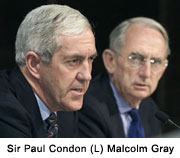Highlights of ICC corruption report
Highlights of the International Cricket Council's Anti-Corruption Unit matchfixing report released on Wednesday.
- Corrupt practices and deliberate under-performances still permeate all aspects of the game.
- Blatant cases and excesses have been stopped but there is still "a small core of players and others who continue to manipulate the results of matches or occurrences within matches for betting purposes".
- Investigation had been met by "conspiracy of silence".
- Anti-Corruption Unit head Paul Condon says he spoke to people who "have been threatened and others who have alleged a murder and a kidnapping linked to cricket corruption".
 - Report refers to allegation of murder in South Africa which could have been a "contract killing as a result of a dispute between rival corruptors from other countries." It says it is too early to make conclusions about organised crime
- Report refers to allegation of murder in South Africa which could have been a "contract killing as a result of a dispute between rival corruptors from other countries." It says it is too early to make conclusions about organised crime
targetting the game but "the proceeds of corruption in cricket are sufficiently large to attract the attention of organised crime".
- Unit told that corruption began in England during the 1970s where team allegedly conspired to fix matches.
- Match-fixing, related to betting, became established in the late 1970s where players under-performed to order and mushroomed in the 1980s and 1990s with almost daily television coverage of one-day internationals.
- Condon told that cricketers were paid less than performers in such sports as soccer, golf, tennis and formula one and were therefore more vulnerable to approaches. "Cricketers were coerced into malpractice because of threats to them and their families."
- Corruptors used "classic seduction" techniques which were often "subtle, ambiguous and patient".
- Scale of the problem has justifiably undermined confidence in the integrity of the game and the ability of those who run the game nationally and internationally.
Recommendations:
- Players should have greater say in running of the game and a comprehensive training and awareness programme for players and officials established to warn them about the problems.
- Controlled access for bookmakers to players and restricted use of mobile phones.
- Extra vigilance and security necessary at certain one-day tournament venues such as Sharjah, Canada and Singapore.
Mail Cricket Editor
(C) 2000 Reuters Limited. All rights reserved. Republication or redistribution of Reuters content, including by framing or similiar means, is expressly prohibited without the prior written consent of Reuters. Reuters and the Reuters Sphere logo are registered trademarks and trademarks of the Reuters group of companies around the world.